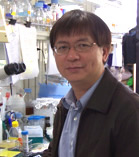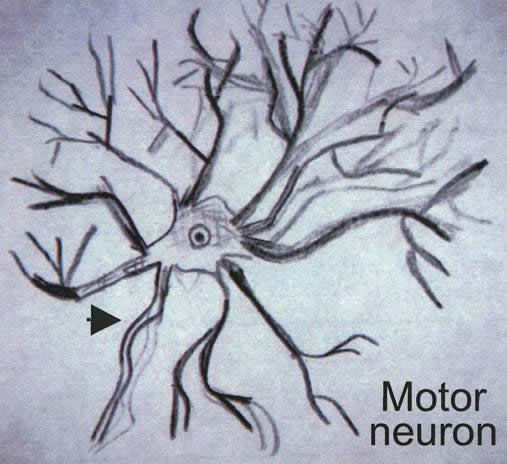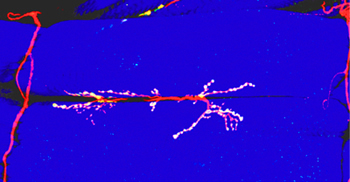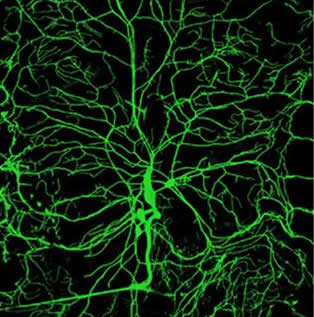Cheng-Ting Chien Ph.D.
|
Research Fellow, Institute of Molecular Biology Coordinator, NPAS |
![]()
| Years | Position | Affiliation |
| 1993 | Ph.D. | Dept. Biochem. and Cell Biol., SUNY at Stony Brook, USA |
| 1993-96 | HHMI/Univ. California - San Francisco, USA | |
| 1996-2000 | Assistant Research Fellow | Institute of Molecular Biology, Academia Sinica |
| 2000-2004 | Associate Research Fellow | Institute of Molecular Biology, Academia Sinica |
| 2004-now | Research Fellow | Institute of Molecular Biology, Academia Sinica |
| 2006-2007 | Associate Director | Institute of Molecular Biology, Academia Sinica |
Research interests
Experience-dependent synapse formation is an underlying mechanism in learning and memory. We study the growth of Drosophila glutamatergic neuromuscular junctions (NMJs) during larval stages as a way to understand how synapse formation is regulated through experience. In larvae with high-crawling activity at high temperature (29°C), the NMJ synapse is enlarged. Previously we found that the integrin/FAK pathway negatively regulates NMJ growth. Her we show that synapse overgrowth in high-crawling larvae is abolished in mutants defective in the integrin/FAK pathway. The extracellular matrix component LanA (laminin α3/5) functions as a local signal to specifically restrict the synapse growth. The synapse overgrowth in integrin/FAK mutants or in high-crawling larvae is suppressed with the addition of forskolin or di-cAMP, suggesting the involvement of adenylyl cyclase (AC) and cAMP in the pathway. We further show that neurofibromatosis 1 (NF1) is involved in mediating integrin/FAK signaling to downstream AC/cAMP activity. How FAK controls NF1 activity in the long-term modulation of synapse growth will be discussed.Protein degradation by the ubiquitin proteasome system regulates dynamic cellular processes including synapse formation and remodeling. We have studied the regulation of cullin-RING ubiquitin ligases (CRLs) by Nedd8 modification, and the function of CRLs in developmental processes such as Hedgehog signaling and glial differentiation. We will continue study on protein ubiquitination and deubiquitination in synaptogenesis, using the Drosophila glutamatergic neuromuscular junctions (NMJs) as the model system.
Selected publications
-
Wu, J.-T., Lin, H.-C., Hu, Y.-C. and Chien, C.-T.* (2005) Neddylation and deneddylation regulate Cul1 and Cul3 protein accumulation. Nat. Cell Biol. 7, 1014-1020.
-
Wu, J.-T., Chan Y.-R. and Chien, C.-T.* (2006) Protection of cullin-RING E3 ligases by CSN-UBP12. Trends Cell Biol. 16(7):362-369 (review).
-
Ou C.-Y., Wang C.-H., Jiang J., Chien C.-T.* (2007) Suppression of Hedgehog signaling by Cul3 ligases in proliferation control of retinal precursors. Developmental Biology 308:106–119.
-
Ho, M. S., Ou, C., Chan, Y., Chien, C.-T.* and Pi, H.*. (2008) The utility F-box for protein destruction. Cellular and Molecular Life Sciences 65: 1977-2000 (invited review).
-
Chan, Y., Yoon, J, Wu, J.-T., Kim, H.-J., Pan, K.-T., Yim, J., Chien, C.-T.*, (2008) DEN1 deneddylates non-cullin proteins in vivo. J Cell Sci. 121: 3218-3223.
-
Tsai P.-I., Kao H.-K, Grabbe C., Lee Y.-T., Ghose A., Lai T.-T., Peng K.-P., Van Vactor D., Palmer R. H., Chen R.-H., Yeh S.-R., Chien C.-T.* (2008) Fak56 functions downstream of integrin alphaPS3/beta-nu and suppresses MAPK activation in neuromuscular junction growth. Neural Development 3:26.
- Lin C.-H., Tsai P.-I, Wu R.-M. and C.-T. Chien* (2010) LRRK2 G2019S Mutation Induces Dendrite Degeneration through Mislocalization and Phosphorylation of Tau by Recruiting Autoactivated GSK3b.J. Neurosci.,30(39):13138-13149



